Bosch has reportedly announced its plans to invest USD 2.98 billion by 2026 in its semiconductor business under the IPCEI funding program on Microelectronics and Communications Technology.
According to Bosch management board Chairman, Dr. Stefan Hartung, microelectronics is a major contributor to the success of all business areas of the company. It holds key to the internet of things, mobility, and "invented for life” technology.
With this investment, Bosch plans to fund the building of two new development centers- in Dresden and Reutlingen- at an overall cost of more than USD 169.47 million.
Furthermore, it will spend around USD 249.11 million on the creation of a further 3,000 sq. mt of clean room space at its Dresden wafer fab.
Under the European Chips Act, the German federal government and the European Union are offering more funds to develop a strong microelectronics ecosystem in Europe. This will help in doubling Europe’s share of global semiconductor production to 20% by 2030.
The newly unveiled IPCEI program mainly intends to promote innovation and research. Dr. Hartung has stated that the primary intention must be to develop chips for specific requirements of the European market.
This strategic investment in microelectronics opens innovation avenues for Bosch. New fields include systems-on-a-chip like the radar sensors used by vehicles to perform 360o scans of their surroundings in automated driving.
The German company seeks to improve such components, making them smarter, smaller, and cheaper to produce. It is working to upgrade its own MEMS (microelectromechanical systems) particularly for the consumer goods sector.
Also, to solidify its position as a market leader in MEMS technology, Bosch plans to develop its MEMS sensors on 300mm wafers. The production of these sensors is slated to commence by 2026.
Source credit:
